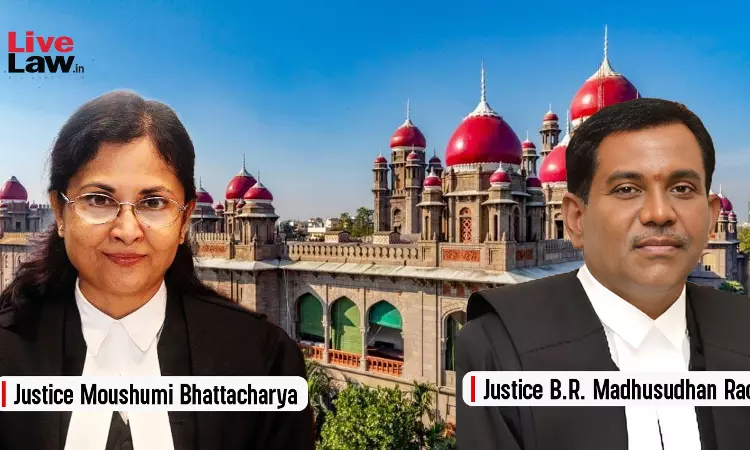- Home
- /
- High Courts
- /
- Telangana High Court
- /
- Telangana HC Sets Aside Order For...
Telangana HC Sets Aside Order For Retrial Of Murder Accused Without Challenge To Acquittal, Says It Violated Constitutional Guarantee
Fareedunnisa Huma
1 May 2025 12:45 PM IST
A division bench of the Telangana High Court has set aside the order passed by a Single Judge, directing a re-trial of an accused, who was acquitted of murder charges without there being any challenge to the acquittal order.Justice Moushumi Bhattacharya and Justice B.R. Madhusudhan Rao passed the order in a criminal appeal, challenging the order passed by the District and Sessions Court,...
A division bench of the Telangana High Court has set aside the order passed by a Single Judge, directing a re-trial of an accused, who was acquitted of murder charges without there being any challenge to the acquittal order.
Justice Moushumi Bhattacharya and Justice B.R. Madhusudhan Rao passed the order in a criminal appeal, challenging the order passed by the District and Sessions Court, which sentenced the appellant to life for the offence punishable under section 302 of the IPC and 6 months for the offence punishable under section 379 of the IPC.
Background
The District and Sessions Court passed the impugned order following directions by the High Court, wherein a re-trial of the accused/appellant was ordered, under 302 and 379 of the IPC for which the accused/appellant was previously acquitted.
Curiously, the single judge bench of the High Court passed the orders of re-trial in an appeal filed by the accused/appellant challenging his conviction under section 411 of IPC, in the same case.
When the accused/appellant was convicted for the offenses under sections 302 and 379 of the IPC, he challenged the same by way of the present appeal.
Court's verdict
The Division Bench noted that the order was not only in violation of section 300(1) of the CrPC and 337(1) of the BNSS but also against Article 20(2) that prohibits a person from being prosecuted and punished for the same offense more than once.
“An order passed in violation of a constitutional guarantee and fundamental right along with the law of the land on the prohibition of a person being tried twice for the same offence while the conviction or acquittal remains in force, would upend all that follows after passing of the order. Therefore, the re-trial of the appellant for a charge for which the appellant was acquitted by the first judgment dated 16.07.2012 while the appellant's acquittal for the offences under sections 302 and 379 of the IPC remained in force, would be hit by section 300(1) of the Cr.P.C and section 337(1) of the BNSS. The fundamental right of the appellant under Article 20(2) of the Constitution would also be irrevocably impacted. The domino-effect of all subsequent proceedings being nullified would include the impugned judgment dated 28.01.2025 by which the appellant was convicted of the offences under sections 302 and 379 of the IPC,” held the Bench.
Relying on the judgment rendered in Ukha Kolhe Vs. State of Maharashtra, the Bench noted that the orders of re-trial should only be passed in exceptional circumstances, when there was a lack of jurisdiction or if the trial was vitiated by serious illegalities.
Relying on Section 401(3) of the CrPC, the bench noted “ the judgment is replete with observations and findings against the appellant for having wrongly been acquitted of the charges under sections 302 and 379 of the IPC. These findings and observations impinge on the protection granted under section 401 (3) of the Cr.P.C to a person who has already been acquitted by the Trial Court, safeguarding him/her from being convicted of the same offence by the High Court.”
The Bench noted that the Single Judge ought not to have passed an order for re-trial when the acquittal was never in question. Moreover, the Bench noted that the Single judge Bench never set aside the order of acquittal and merely directed retrial. This the Bench held was germane for the purposes of section 300(1) of the CrPC and section 337(1) of the BNSS, which are analogous of each other and prohibit a person from being tried for the same offense twice.
Relying on P. Manikandan vs. Central Bureau of Investigation and State of AP v. Thadi Narayana, the Bench showcased some of the occasions at which the Apex Court deprecated the practice of ordering re-trial without there being a challenge to the same.
Thus, the appeal was allowed.
In conclusion the Division Bench held: “The maxim 'nemo debet bis vexari pro eadem causa” (no person should be vexed twice for the same offence) embodies the Rule of common law that no one should be put to peril twice for the same offence.”
Counsel for appellant: P. Krishna Prakash
Counsel for respondent: M. Ramchandra Reddy



